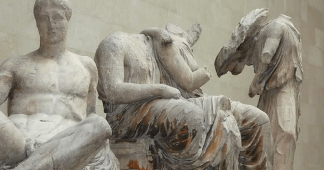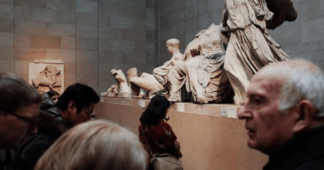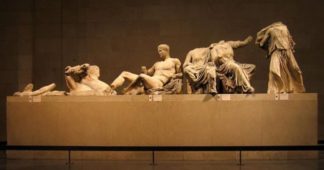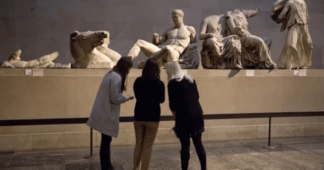By Dr. William Mallinson
In the darkest and dustiest corners of the human mind lurk such unfortunate traits as greed, active racism, cowardice, and even sheer barbarity. So it is with states and empires, most of which have their fair share of skeletons in the cupboard which, when opened, reveal such nasty events as the destruction of Milos (Athens), blinding of the Bulgars (Eastern Roman Empire), the murder of Irish priests, woman and children at Wexford and Drogheda (England), the Amritsar massacre (Britain), the genocide of Armenians and Greeks (Ottoman Empire), the genocide of the Amerindians and the My Lai massacre (USA), the shooting of unarmed Polish prisoners (Soviet Union), the genocide of gypsies and Hebrews (Germany), the bombing of Dresden (the US by day, Britain by night), the genocide of Serbs (Croatia), the genocide of Cambodians (Cambodia), and the butchering of Palestinians at Shatah, Sabrila and elsewhere (Israel). These, and many more, bear testimony to the dark side of Man’s behaviour towards Man, and how eminently uncivilised a species we still are, whatever smart clothes we wear, technological gadgetry we use, and clever theories we expound. When it comes to the crunch, we are simply clothed animals. Our ‘civilised’ technology has meant a greater propensity to kill than hitherto: in the Great War a mere ten million died, while the figure was fivefold in the last world war. Moreover, most who died in the latter were civilians, in contrast to the former.
Such horrors are the nightmare of the dying breed of trained diplomats, who nowadays have far less influence than they used to, because of the ‘improvement’ in communications, the increase in the power of multinational corporations and the concomitant trend towards self-seeking politicians lording it over trained administrators. Today’s ambassador is little more than a cocktail party functionary, sending home reports (which are usually shelved), or secretly helping to cover up for spooks. One cannot imagine the current British Ambassador to Athens indulging in a bit of monument smashing and theft, (although the Americans have certainly stolen a huge amount from Iraq). Plus ça change.
Two hundred years ago, ambassadors had real power, and sometimes this power was abused. Such is the case of Thomas Bruce, Seventh and Eleventh Earl of Elgin and Kincardine respectively, who served, inter alia, as Britain’s ambassador to the Sublime Porte. That the procurement of the sculptures of the Parthenon was illegal, and an act of gross cultural hooliganism has already been proven by numerous academics and others beyond reasonable doubt, and it is not the purpose of this short article to repeat the obvious. What we will to do is analyse and evaluate the cause of the mentality that has allowed this hooliganism to persist for over two hundred years without redress, despite the views of UNESCO, and statements by, for example, President Clinton (when he was president) and Neil Kinnock (when he was leader of the British Labour Party).
Mr.Bruce seems to have been a bit of a rum character, according to the literature, to the point where, as regards his desecration of the Parthenon, he should be called Mr. Brute. He epitomises that particular brand of Scotsman who was a traitor to the independence of Scotland, and only, let us recall, a few decades after Bonnie Prince Charlie’s rebellion to try and free Scotland from the English yoke. But with friends like Bruce, Scotland needed no enemies; nor did Greece. Apart from being a simple money-grubber, and diplomatic wide-boy with no sense of aesthetics, into the bargain, Bruce was more English than Scottish in his imperial outlook. Robert the Bruce must be spinning in his grave.
So much, then, for the act of gross cultural indecency perpetrated by a man with an eye on the main chance, at a time when the corrupt Ottoman Empire was already beginning to experience its death throes, thanks largely to Napoleonic France. But the big question is: why have successive British governments been so eminently unreasonable about returning the sculptures (‘marbles’ really is a rather crude way of describing some of the most beautiful work ever produced as part of a building), despite various statements by eminent statesmen and organisations, and various opinion polls?
First is the simple fact that Britain simply has no culture or monuments that are even incipiently comparable to the Parthenon friezes. The longer that Britain hangs on to these ill-gotten gains, the more obvious it becomes that Britain (but we are really talking about an English mentality here) is good at handling stolen goods. The sculptures apart, British dependent territories such as the Cayman Islands, Bermuda and Gibraltar, and British Crown dependencies such as Jersey and the Isle of Man, are havens for money-launderers. The only difference is that in the case of the British Museum, the act of handling stolen goods is blatant and arrogant, a sign perhaps of Britain’s envy at not being able to have such beautiful indigenous art as Greece. The British Museum is of course itself simply a museum of artefacts procured by the British Empire, and would be better named as the ‘British Colonial Museum’, since there is precious little that is actually British. Many of its artifacts are of course not from the British Empire, but were acquired during periods of confusion and lax administration in Greece, Egypt, Syria and Iran, where bakshish spoke volumes. Such is the case of the ‘Elgin Marbles’. The British Empire has of course now transmogrified into the Commonwealth and a collection of legally questionable military strongpoints, such as Diego Garcia, the Malvinas (Falkland) Islands, Cyprus and Gibraltar. The former has been rented to the Americans, with the brown-skinned British subjects being expelled, and their animals gassed by the British, to make way for the US defence establishment and its money. The white-skinned British subjects of the Falklands/Malvinas were luckier than their Diego Garcian homologues: Thatcher’s Navy sailed across the world to save them. Without the Pentagon, Britain would have been unable to regain the islands, but was able to bask in the illusion that she was still a great power. Perhaps that is part of the psychological problem: Britain simply cannot bear the thought of not being Great Britain. This betrays an enormous sense of insecurity, expressed in acts of post-imperial rigor mortis, such as keeping the Parthenon sculptures. Somehow, keeping them makes Britain feel stronger than she really is. Compare Britain to France, which is an independent country. Britain’s behaviour is mirrored in the fact that Britain no longer has a foreign policy, as de Gaulle said: she merely piggy-backs the US, as Edward Heath said. Britain simply does the US’s bidding, particularly on military matters. On a question like keeping stolen goods, however, she can still pretend to be plucky and Churchillian, since nobody is likely to declare war over the question. She thinks that it is good for her image to be obstinate.
If any proof is needed, despite the simpering protestations of well-paid off designer academics in both Britain and Greece, that British policy has been essentially antithetical to Greek interests since the very inception of the modern Greek state, then elginism is the proof. For apart from a few flashes in the pan, and a few individuals like Canning, the only help Greece has received has been from private individuals such as Lord Byron, or public individuals who were brave enough to go against official British policy, such as Admiral Codrington, whose victory over the Turco-Egyptian fleet the irritated Foreign Secretary, Wellington, described as an ‘untoward event’, betraying a large measure of British understatement. For the British government never even wanted an independent Greece. She was only forced into giving way by the Russians, who had reserved the right by treaty to intervene alone to help Greece. Britain was therefore forced into helping, to keep a finger in the question, for fear of Russia ending up as Greece’s main sponsor, and weakening Britain’s Ottoman friends. The Don Pacifico Affair is another example, when Britain actually threatened Greece with gunboats; while during the Crimean War, Britain, with its then French poodles, blockaded Piraeus. In 1916, Britain and France even interfered militarily in Greece, being beaten back by the King’s forces, and then getting their revenge by backing the controversial Venizelos, who favoured war: Venizelos took Greece into a war which was to lead to the famous catastrophe. The next war is another example of Britain’s disdain. Despite the fact that Greece stood alone with Britain against all the odds, for several months, the help that Britain sent was minimal, and the British basically shunned hard combat with the Germans, confusing many of the tough Greek fighters, who had already earned their spurs against the Italian invaders. The Greek civil war is an even worse story: having supported the strongest anti-German resistance, ELAS, Britain then turned against it, ending up supporting those Greek forces which had been closest to the German occupiers, and fuelling a destructive civil war. It suited Britain, since it used the ‘anti-communist’ civil war as an excuse to hang elginistically on to Cyprus. Since then, the Cyprus question has continued to show that British policy is antithetical to Greek interests. In 1955, Britain colluded secretly with Turkey against Greece, brought Turkey illicitly into the Cyprus equation, and was aware of what the result would be, if not precisely: the destruction of Greek properties and churches in Turkey, and the subsequent expulsion of twelve thousand Greek nationals and hounding out of a further sixty thousand Turkish citizens of Greek stock and of the Christian Orthodox Church. Less than two thousand remain today. And all this, just so the plucky British could hang on to Cyprus for a little longer, just as they are so pluckily hanging on to stolen property. As for more recently, the following quote from a Foreign and Commonwealth Office strategy paper encapsulates the truth about Britain’s elginism and post-imperial rigor mortis: We should also recognise that in the final analysis Turkey must be regarded as more important to Western strategic interests than Greece and that, if risks must be run, they should be risks of further straining Greek rather than Turkish relations with the West.
It is here that we must begin to conclude. Given the background of what has been Britain’s hidden hostility towards Greece since modern Greece’s very beginnings, it is hardly surprising that England hangs on to its stolen goods, even claiming, dodgily, that it can do nothing, because the government sold them to the museum. Even this has been demonstrated to have been done improperly. But, just as Britain is in denial about the dodgy Iraq dossier, and its lies about weapons of mass destruction, on which it based its decision to follow the US into an illegal unilateral attack, so it continues to hang on to stolen goods. British diplomacy, for its part, is unlikely to achieve much, even if a few brave diplomats had the courage to stick their necks out, which they do not. It seems that they are more bent, for example, on promoting homosexuality abroad as their new form of cultural relations. The Polish civil rights ombudsman has protested about ambassador Todd’s exceeding his authority in promoting a ‘UK Guide to Gay, Bi-sexual and Transgender People and their Rights (LGBT)’. Far from apologising for this indecent form of one-sided (what about heterosexual rights?) irrelevance, the Foreign and Commonwealth Office has pompously replied that it ‘has a policy of promoting LGBT rights abroad.’ These, then are the new British values to be promoted. In 2008, the ambassador in Warsaw even hoisted a ‘rainbow flag’ (representing, for those not in the know, homosexuality) next to the British flag. It is a shame that British diplomatic aestheticism seems to concentrate on the well-known English fear of natural sex, rather than on the beauty of ancient sculptures, sculptures which are waiting to be returned to their rightful home. One is tempted to wonder why the British ambassador in Athens, David Landsman, has not emulated his homologue Todd. Does he agree that Britain should not promote ‘LGBT ’in Greece, which could be interpreted as his disobeying his political masters in London? Or perhaps there are subtler ways of promoting ‘LGBT’ in Greece, through articles placed with the British Embassy’s list of compliant and sycophantic Greek journalists. At any rate, perhaps the Greek government should show some real gumption, and initiate a proper campaign to get the plunderers to return the goods. It could begin by raising a flag next to the Greek one at its embassies, with blood dripping off one of the best stolen statues, superimposed onto the Parthenon. It’s time Britain came clean on the Parthenon, and made up for all the unprovoked damage it has done to Greece.
We remind our readers that publication of articles on our site does not mean that we agree with what is written. Our policy is to publish anything which we consider of interest, so as to assist our readers in forming their opinions. Sometimes we even publish articles with which we totally disagree, since we believe it is important for our readers to be informed on as wide a spectrum of views as possible.











